西交大学位辅导资料
- 格式:doc
- 大小:253.00 KB
- 文档页数:52
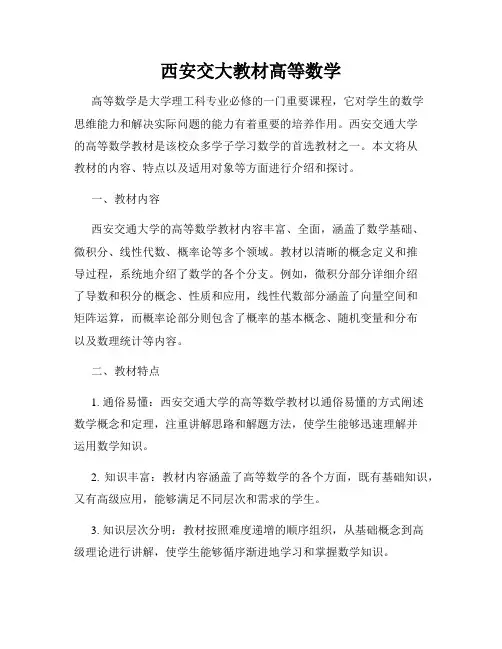
西安交大教材高等数学高等数学是大学理工科专业必修的一门重要课程,它对学生的数学思维能力和解决实际问题的能力有着重要的培养作用。
西安交通大学的高等数学教材是该校众多学子学习数学的首选教材之一。
本文将从教材的内容、特点以及适用对象等方面进行介绍和探讨。
一、教材内容西安交通大学的高等数学教材内容丰富、全面,涵盖了数学基础、微积分、线性代数、概率论等多个领域。
教材以清晰的概念定义和推导过程,系统地介绍了数学的各个分支。
例如,微积分部分详细介绍了导数和积分的概念、性质和应用,线性代数部分涵盖了向量空间和矩阵运算,而概率论部分则包含了概率的基本概念、随机变量和分布以及数理统计等内容。
二、教材特点1. 通俗易懂:西安交通大学的高等数学教材以通俗易懂的方式阐述数学概念和定理,注重讲解思路和解题方法,使学生能够迅速理解并运用数学知识。
2. 知识丰富:教材内容涵盖了高等数学的各个方面,既有基础知识,又有高级应用,能够满足不同层次和需求的学生。
3. 知识层次分明:教材按照难度递增的顺序组织,从基础概念到高级理论进行讲解,使学生能够循序渐进地学习和掌握数学知识。
4. 原理与实践相结合:教材注重讲解数学原理的同时,也注重实际问题的应用,将抽象的数学概念与实际问题相结合,培养学生的数学建模和解决实际问题的能力。
三、适用对象西安交通大学的高等数学教材适用于广大理工科专业的学生,既包括初次接触高等数学的本科生,也包括需要深入学习高等数学的研究生。
教材对于数学学科的专业学习和科研都有重要的指导作用,可作为数学专业学生的日常学习和考试复习的重要参考资料。
结语西安交通大学的高等数学教材凭借其丰富的内容、通俗易懂的讲解和循序渐进的学习方式,为广大学生提供了一本理想的学习工具。
通过系统学习和掌握该教材,学生能够培养扎实的数学基础和解决实际问题的能力,为今后的学习和科研打下坚实的基础。
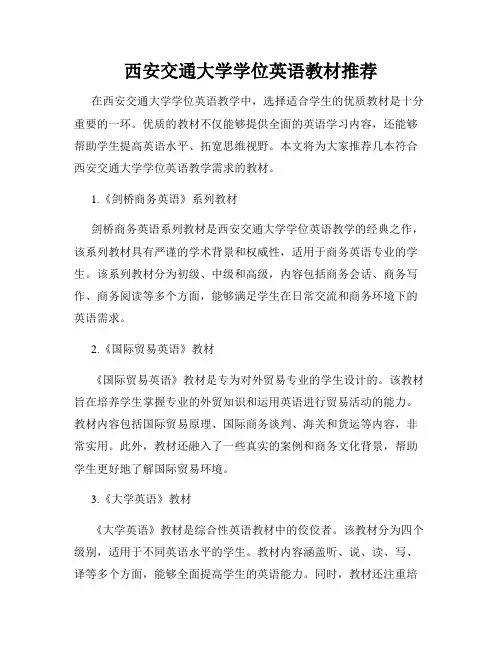
西安交通大学学位英语教材推荐在西安交通大学学位英语教学中,选择适合学生的优质教材是十分重要的一环。
优质的教材不仅能够提供全面的英语学习内容,还能够帮助学生提高英语水平、拓宽思维视野。
本文将为大家推荐几本符合西安交通大学学位英语教学需求的教材。
1.《剑桥商务英语》系列教材剑桥商务英语系列教材是西安交通大学学位英语教学的经典之作,该系列教材具有严谨的学术背景和权威性,适用于商务英语专业的学生。
该系列教材分为初级、中级和高级,内容包括商务会话、商务写作、商务阅读等多个方面,能够满足学生在日常交流和商务环境下的英语需求。
2.《国际贸易英语》教材《国际贸易英语》教材是专为对外贸易专业的学生设计的。
该教材旨在培养学生掌握专业的外贸知识和运用英语进行贸易活动的能力。
教材内容包括国际贸易原理、国际商务谈判、海关和货运等内容,非常实用。
此外,教材还融入了一些真实的案例和商务文化背景,帮助学生更好地了解国际贸易环境。
3.《大学英语》教材《大学英语》教材是综合性英语教材中的佼佼者。
该教材分为四个级别,适用于不同英语水平的学生。
教材内容涵盖听、说、读、写、译等多个方面,能够全面提高学生的英语能力。
同时,教材还注重培养学生的文化意识和跨文化交际能力,在培养学生语言技能的同时,也帮助学生了解外国文化和思维方式。
4.《新视野大学英语》教材《新视野大学英语》是一套经典的大学英语教材,适用于综合英语课程。
该教材以任务型语言教学为主导,内容紧密结合学生的生活和学习实际。
机动性的教学方式和多样化的课堂活动培养了学生的学习兴趣和创造力,提高了学生的综合英语水平。
总结:以上推荐的教材仅为西安交通大学学位英语教学的一部分,这些教材在内容的选择和编排上都经过了精心设计,能够满足学生在学习英语过程中的不同需求。
选择适合自己的教材,并积极参与课堂活动,是学习英语的关键。
希望同学们能够充分利用这些教材,提高自己的英语能力,为将来的学习和工作打下坚实的基础。
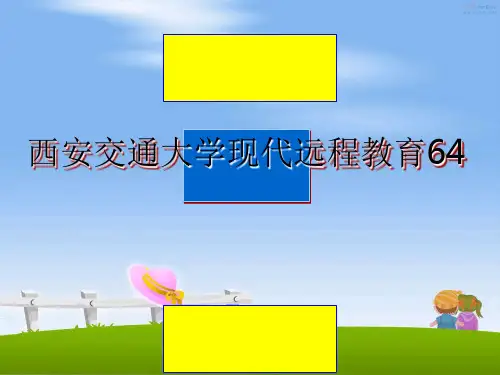
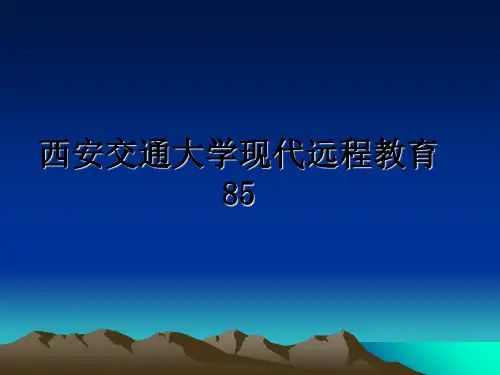
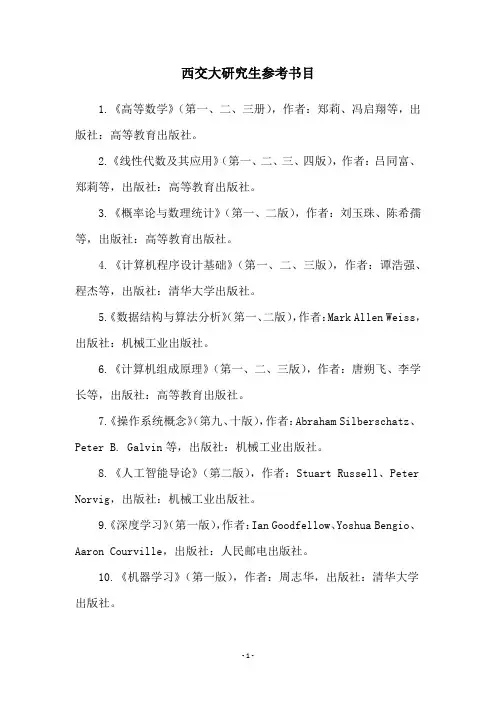
西交大研究生参考书目
1.《高等数学》(第一、二、三册),作者:郑莉、冯启翔等,出版社:高等教育出版社。
2.《线性代数及其应用》(第一、二、三、四版),作者:吕同富、郑莉等,出版社:高等教育出版社。
3.《概率论与数理统计》(第一、二版),作者:刘玉珠、陈希孺等,出版社:高等教育出版社。
4.《计算机程序设计基础》(第一、二、三版),作者:谭浩强、程杰等,出版社:清华大学出版社。
5.《数据结构与算法分析》(第一、二版),作者:Mark Allen Weiss,出版社:机械工业出版社。
6.《计算机组成原理》(第一、二、三版),作者:唐朔飞、李学长等,出版社:高等教育出版社。
7.《操作系统概念》(第九、十版),作者:Abraham Silberschatz、Peter B. Galvin等,出版社:机械工业出版社。
8.《人工智能导论》(第二版),作者:Stuart Russell、Peter Norvig,出版社:机械工业出版社。
9.《深度学习》(第一版),作者:Ian Goodfellow、Yoshua Bengio、Aaron Courville,出版社:人民邮电出版社。
10.《机器学习》(第一版),作者:周志华,出版社:清华大学出版社。
- 1 -。
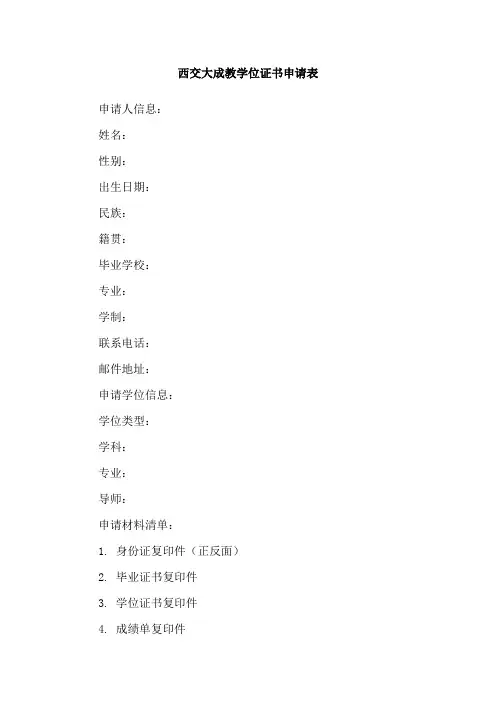
西交大成教学位证书申请表申请人信息:
姓名:
性别:
出生日期:
民族:
籍贯:
毕业学校:
专业:
学制:
联系电话:
邮件地址:
申请学位信息:
学位类型:
学科:
专业:
导师:
申请材料清单:
1. 身份证复印件(正反面)
2. 毕业证书复印件
3. 学位证书复印件
4. 成绩单复印件
5. 推荐信(至少两封)
6. 个人陈述或研究计划(不超过1000字)
7. 其他支持材料(如论文、获奖证书等)
申请费用:
申请费用请参考学校官网或与招生办公室联系。
申请流程:
1. 填写申请表并准备申请材料。
2. 提交申请材料至招生办公室。
3. 等待学校审核并通知面试或录取结果。
4. 如录取,完成入学手续并缴纳学费。
5. 领取学位证书。
注意事项:
1. 请务必填写真实、准确的个人信息。
2. 提交的申请材料必须是原件或经过公正认证的复印件。
3. 申请人需按时缴纳相关费用。
4. 申请截止日期请参考学校官网或与招生办公室联系。
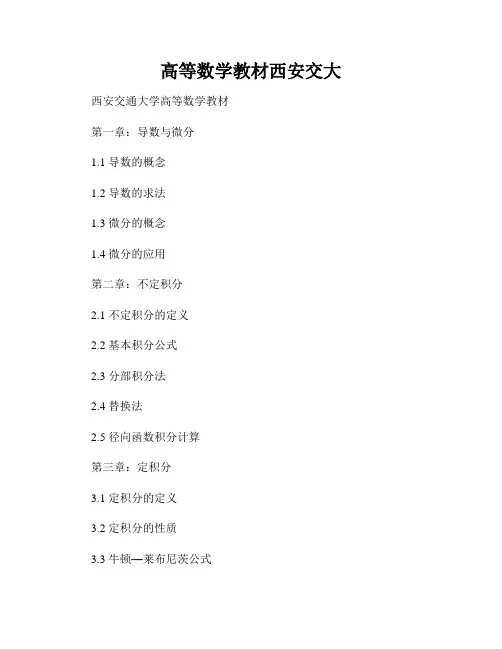
高等数学教材西安交大西安交通大学高等数学教材第一章:导数与微分1.1 导数的概念1.2 导数的求法1.3 微分的概念1.4 微分的应用第二章:不定积分2.1 不定积分的定义2.2 基本积分公式2.3 分部积分法2.4 替换法2.5 径向函数积分计算第三章:定积分3.1 定积分的定义3.2 定积分的性质3.3 牛顿—莱布尼茨公式3.4 定积分的计算方法3.5 微积分基本定理第四章:微分方程4.1 微分方程的基本概念4.2 一阶微分方程的解法4.3 高阶微分方程的解法4.4 常系数齐次线性微分方程4.5 变量分离与恰当方程4.6 非齐次线性微分方程第五章:级数与幂级数5.1 数列的极限5.2 级数的概念与性质5.3 正项级数收敛判别法5.4 幂级数的收敛与发散5.5 幂级数的求和与应用第六章:多元函数微分学6.1 多元函数的概念与性质6.2 偏导数与全微分6.3 隐函数与参数方程6.4 向量值函数与参数曲线第七章:多元函数积分学7.1 二重积分的概念与性质7.2 二重积分的计算方法7.3 曲线与曲面积分7.4 三重积分的概念与性质7.5 三重积分的计算方法第八章:无穷级数与场论8.1 函数项级数的收敛性8.2 广义积分8.3 函数项级数的一致收敛性8.4 Fourier级数8.5 傅里叶变换以上是西安交通大学高等数学教材的章节目录。
本教材包含了导数与微分、不定积分、定积分、微分方程、级数与幂级数、多元函数微分学、多元函数积分学以及无穷级数与场论等内容。
通过学习本教材,学生将掌握高等数学的基础知识和方法,为进一步学习数学及相关学科打下坚实的基础。
本教材内容丰富,注重理论与实践相结合,能够帮助学生提高数学思维能力和解决问题的能力。
教材由西安交通大学数学系编写,经过多年的教学实践和修订,具有很高的教学质量。
希望广大学生能够认真学习本教材,并能够在学习中体会到数学的美妙与应用的广泛性。
祝愿大家在高等数学学习中取得优异的成绩!。
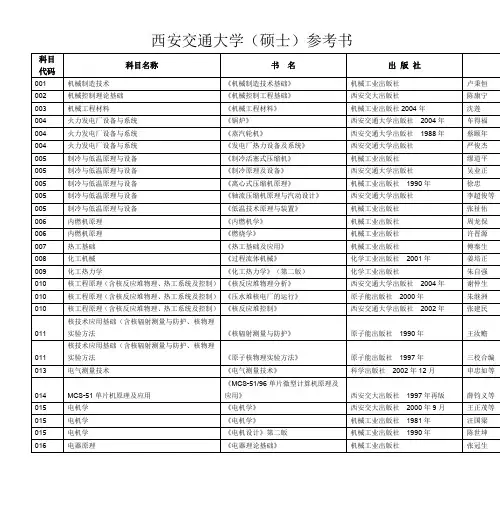
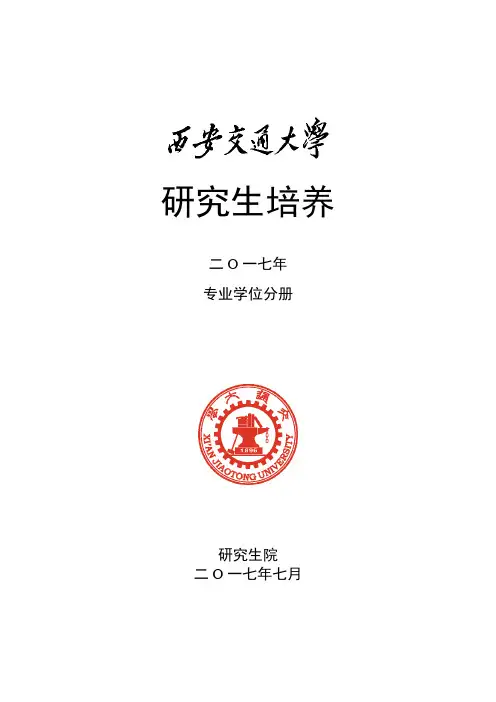
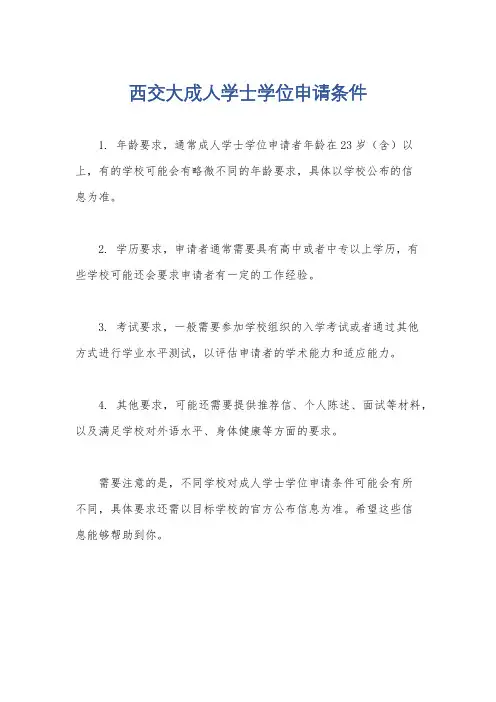
西交大成人学士学位申请条件
1. 年龄要求,通常成人学士学位申请者年龄在23岁(含)以上,有的学校可能会有略微不同的年龄要求,具体以学校公布的信
息为准。
2. 学历要求,申请者通常需要具有高中或者中专以上学历,有
些学校可能还会要求申请者有一定的工作经验。
3. 考试要求,一般需要参加学校组织的入学考试或者通过其他
方式进行学业水平测试,以评估申请者的学术能力和适应能力。
4. 其他要求,可能还需要提供推荐信、个人陈述、面试等材料,以及满足学校对外语水平、身体健康等方面的要求。
需要注意的是,不同学校对成人学士学位申请条件可能会有所
不同,具体要求还需以目标学校的官方公布信息为准。
希望这些信
息能够帮助到你。
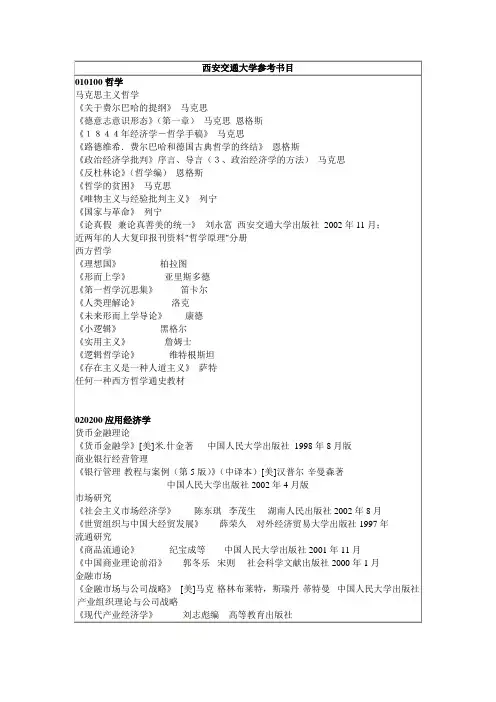
申请学士学位专业主干课程【附件三】西安交通大学成人高等教育及高等教育自学考试本科毕业生申请学士学位专业主干课程及参考书目录序号专业课程名称教材名称(实验指导书)主编出版社及版本(出版时间)1 计算机科学与技术计算机应用基础大学计算机基础李建忠西北大学出版社(09年版)2 C程序设计C语言程序设计(第2版)谭浩强清华大学出版社(第二版) 3 计算机网络计算机网络吴功宜清华大学出版社(第三版) 4 数学与应用数学计算机应用基础大学计算机基础李建忠西北大学出版社(09年版)5 概率论与数理统计概率论与数理统计贺兴时、薛红陕西科学技术出版社(04年版)6 数值分析数值分析教程刘长安西北工业大学出版社(05年版)7 电气工程与自动化(电力系统自动化)计算机应用基础大学计算机基础李建忠西北大学出版社(09年版)8 电机学电机学闫治安、崔新艺西安交大出版社(第二版)9 自动控制原理自动控制原理薛安克西安电子科技大学出版(06年版)10 热能与动力工程计算机应用基础计算机应用基础李建忠西北大学出版社(09年版)11 工程热力学工程热力学沈维道高等教育出版社(第三版)12 电站锅炉原理电站锅炉原理容銮恩、袁振福中国电力出版社(08年版)西安交通大学成人高等教育及高等教育自学考试本科毕业生申请学士学位专业主干课程及参考书目录序号专业课程名称教材名称(实验指导书)主编出版社及版本(出版时间)13 土木工程计算机应用基础计算机应用基础李建忠西北大学出版社(09年版)14 现代施工技术建筑施工技术姚谨英中国建筑工业出版社(08年版)15 建筑项目管理建筑项目管理田金信高等教育出版社(08年版)16 机械工程及自动化计算机应用基础计算机应用基础李建忠西北大学出版社(最新版)17 机械工程材料机械工程材料沈莲机械工业出版社(09年版)18 机械制造技术基础机械制造技术基础卢秉恒机械工业出版社(第三版)19 应用电子技术教育计算机应用基础计算机应用基础李建忠西北大学出版社(最新版)20 数字电子技术数字电子技术张克农高等教育出版社(08年版)21 职业教育学职业教育学马建富华东师范大学出版社(08年版)22 焊接技术与工程计算机应用基础计算机应用基础李建忠西北大学出版社(最新版)23 机械工程材料机械工程材料沈莲机械工业出版社(09年版)24 焊接结构与设计焊接结构学方洪渊机械工程出版社(08年版)西安交通大学成人高等教育及高等教育自学考试本科毕业生申请学士学位专业主干课程及参考书目录序号专业课程名称教材名称(实验指导书)主编出版社及版本(出版时间)25 工业工程基础工业工程基础工业工程张树武自考全国考委26 生产管理与质量工程生产管理工程蒋贵善自考全国考委27 设施规划与设计设施规划与设计王家善自考全国考委28 会计学管理学原理管理学原理与方法(5版)周三多复旦大学出版社(第五版)29 微观经济学西方经济学(微观部分)(4版)高鸿业中国人民大学出版社(第四版)30 高级财务会计高级财务会计(2版)刘永泽东北财大出版社(第二版)31 金融学微观经济学西方经济学(微观部分)(4版)高鸿业中国人民大学出版社(第四版)32 金融审计金融审计杨森陕西人民出版社33 中央银行学中央银行学王光谦高等教育出版社34 保险学货币银行学货币银行学黄达中国人民大学出版社2000年版35 保险学保险学魏华林林宝清高等教育出版社(第二版)36 财产保险财产保险乔林王储瑾中国人民大学出版社2008年版西安交通大学成人高等教育及高等教育自学考试本科毕业生申请学士学位专业主干课程及参考书目录序号专业课程名称教材名称(实验指导书)主编出版社及版本(出版时间)37 工商管理微观经济学微观经济学胡放之上海财经出版社(09年版)38 市场营销学市场营销学曹小春北京大学出版(07年版)39 人力资源管理人力资源开发与管理郑绍濂复旦大学出版社(第三版)40 旅游管理微观经济学微观经济学胡放之上海财经出版社(09年版)41 旅游市场营销学旅游市场营销张俐俐清华大学出版社(最新版)42 旅游法规旅游法教程韩玉灵旅游教育出版社(07年版)43 国际经济与贸易微观经济学微观经济学胡放之上海财经出版社44 市场营销学市场营销学刘苍劲东北财大出版社45 国际贸易与实务国际贸易理论与实务冯宗宪西交大出版社46 电子商务网络营销与策划网络营销与策划褚福灵经济科学出版社47 客户关系管理客户关系管理杨路明重庆大学出版社48 企业资源计划ERP 企业资源计划(ERP)田军机械工业出版社西安交通大学成人高等教育及高等教育自学考试本科毕业生申请学士学位专业主干课程及参考书目录序号专业课程名称教材名称(实验指导书)主编出版社及版本(出版时间)49 工程管理工程项目管理工程项目管理梁世连中国建材工业出版社(07年版)50 工程经济学工程经济分析刘新梅西安交大出版社(07年版)51 建设项目评估建设项目评估王华北京大学出版社(08年版)52 汉语言文学语言学概论语言学概论倪立民浙江大学出版社(第二版)53 现代汉语现代汉语导论许宝华复旦大学出版社(08年版)54 中国现代文学史中国现代文学史刘勇北京师范大学出版(08年版)55 法学民法学民法魏振瀛高教、北大联合出版(第三版)56 刑事诉讼法刑事诉讼法张坚中国政法大学出版社(08年版)57 商法学商法学范健高教、北大联合出版(第三版)58 临床医学生理学大学生理学(2版)朱妙章高等教育出版社(2005.8)59 内科学内科学(7版)陆再英人民卫生出版社60 外科学外科学(7版)吴在得人民卫生出版社西安交通大学成人高等教育及高等教育自学考试本科毕业生申请学士学位专业主干课程及参考书目录序号专业课程名称教材名称(实验指导书)主编出版社及版本(出版时间)61 口腔医学口腔诊断学口腔颌面医学影像诊断学(6版)马绪臣人民卫生出版社62 口腔颌面外科学口腔颌面外科学(6版)邱蔚六人民卫生出版社63 口腔修复学口腔修复学(6版)马轩祥人民卫生出版社64 护理学护理学导论护理学导论(2版)李小妹人民卫生出版社65 内科护理学内科护理学(4版)尤黎明人民卫生出版社66 外科护理学外科护理学(4版)曹伟新人民卫生出版社67 医学检验预防医学预防医学(5版)傅华人民卫生出版社68 临床体液检验临床血液学与检验(4版)倪语星人民卫生出版社69 免疫学及免疫检验临床免疫学与检验(4版)王兰兰人民卫生出版社7。
西安交大电信学院的高数教辅资料
当今社会科学技术迅速发展,特别是计算机科学及信息技术日新月异的发展,已经将数学渗透到各个领域,学习任何一门工科课程都必须用到高等数学知识,必须先学习高等数学。
因此,高等数学是全国各高校本科生必修的一门重要的基础课。
《高等数学(一)》有4章内容,包括:微积分的理论基础(函数,极限及连续),一元函数微分学及其应用(导数,微分,中值定理,函数形态),一元函数积分学及其应用(定积分,微积分基本公式,不定积分,反常积分,几类简单的微分方程),无穷级数(常数项级数,函数项级数,幂级数,Fourier级数)。
为方便学习,我们将每讲内容分成了若干小片段,一个片段讲解1到2个知识点,便于学习者理解掌握。
而且针对每一讲的教学内容都配有一定量的典型例题、释义解难、思考题、数学史资料等,每讲还配有自测题供学习者作为平时成绩考核之用。
本课程的教学目标是要求学生系统地掌握一元函数微积分学、无穷级数、多元函数微积分学、常微分方程的基本概念、基本理论和基本方法,同时通过数学实验来培养学生的综合素质,即实验动手能力,分析设计能力及团队合作精神,拓展学生思维,激发学生的创新意识,在数学分析的基本思维方法受到必要的训练,在运算能力、抽象思维能力、逻辑推理能力、空间想象能力方面有一定提高,并对现代数学的某些思想方法有所了解,以利于与今后学习现代数学接轨。
【附件三】
西安交通大学成人高等教育及高等教育自学考试本科毕业生申请学士学位专业主干课程及参考书目录
西安交通大学成人高等教育及高等教育自学考试本科毕业生申请学士学位专业主干课程及参考书目录
西安交通大学成人高等教育及高等教育自学考试本科毕业生申请学士学位专业主干课程及参考书目录
西安交通大学成人高等教育及高等教育自学考试本科毕业生申请学士学位专业主干课程及参考书目录
西安交通大学成人高等教育及高等教育自学考试本科毕业生申请学士学位专业主干课程及参考书目录
西安交通大学成人高等教育及高等教育自学考试本科毕业生申请学士学位专业主干课程及参考书目录
(注:可编辑下载,若有不当之处,请指正,谢谢!)。
V ocabulary and StructurePart One1. It took two hours to _____ the bicycle.A. operateB. runC. gatherD. assemble2. He worked in bed, using a portable typewriter, and was completely _____ in his task.A. employedB. consumedC. absorbedD. concerned3. Mr. Smith said that he did not want to _____ any further responsibilities.A. take onB. get onC. put upD. look up4. He does not _____ his workmates and there are often disagreements between them.A. go on withB. put up withC. get along withD. keep up with5. New Zealand’s mild, moist climate is _____ to the growth of grass.A. niceB. favorableC. pleasantD. hopeful6. The course in philosophy opened up new _____ for the students.A. pagesB. boundaryC. horizonsD. extent7. My camera can be _____ to take pictures in cloudy or sunny conditions.A. treatedB. adjustedC. adoptedD. remedied8. They wore their best clothes and _____ the table with their best silver and china.A. put `B. setC. getD. let9. Would you mind turning off the television? It _____ my concentration.A. interferes withB. suspendsC. bothers withD. interrupts10. The repairman examined the car engine _____ but could not find anything wrong with it.A. exactlyB. approximatelyC. preciselyD. thoroughly11. I must have browsed through hundreds of guides but I have no _____ where to go for this year’s holiday.A. conceptB. remarkC. ideaD. concern12. When we finally _____ to get home after the tiring journey, we could hardly move a step further.A. triedB. managedC. succeededD. endeavored13. Having been found guilty, the man was given a severe _____ by the judge.A. serviceB. sentenceC. crimeD. crisis14. From these comments I _____ that income tax will be increased.A. inferB. implyC. suggestD. hint15. When I took his temperature, it was two degrees above_____ .A. averageB. ordinaryC. regularD. normal16. The problem of storing the sun’s heat is supposed _____ by scientists all over the world.A. to have been studiedB. to be studiedC. having been studiedD. being studied17. Nobody but Sam and John _____ in the laboratory when I was making the experiment.A. wereB. wasC. areD. is18. He had not remembered my name _____ after he greeted me.A. whenB. untilC. asD. while19. I don’t think she’ll be upset, but I’ll see her in case _____.A. she willB. she wouldC. she doesD. she is20. So little _____ about American history that the lecture was completely beyond me.A. did I knowB. I knewC. do I knowD. I know21. It was high time that this argument _____ put to an end.A. must beB. isC. wasD. should be22. An investigation was made into the accident, _____ fifty people were killed.A. in whichB. whenC. whereD. for that23. _____ such a good chance, he planned to learn more.A. To be givenB. Having been givenC. Having givenD. Giving24. By the end of April Peter _____ here for three months.A. will have stayedB. will stayC. staysD. has stayed25. Maggie ran back to the kitchen, eggs _____ carefully in her hands.A. to be heldB. heldC. were heldD. holding26. I like black coffee so much because the stronger it is, _____.A. I like it betterB. the more I likeC. the better I like itD. I like it more27. He said that he would rather stay at home than _____ out for a walk.A. goingB. goC. to goD. went28. _____ they will go there to try another experiment hasn’t been decided yet.A. WhetherB. IfC. WhyD. What29. Let’s go swimming, _____ we?A. doB. don’tC. areD. shall30. The weather of the city was rather hot, but after he lived there for a while he _____ it.A. would use toB. got used toC. used toD. had used toPart Two1. Color and sex are not relevant _____ whether a person is suitable for the job.A. onB. forC. toD. with2. If you need further information, please _____ our office.A. consumeB. constructC. contactD. contain3. Everyone is encouraged to _____ food or clothing for those who suffered a great deal in the flood.A. contributeB. distributeC. attributeD. participate4. The rapid development of communications technology is transforming the _____ in which people communicate across time and space.A. moodB. missionC. visionD. manner5. If you have any problems during your study here, please do not _____ to call me for help.A. hesitateB. forgeC. urgeD. request6. Although the traffic is not busy, he likes to drive at a _____ speed.A. spareB. moderateC. fastD. moral7. She is already 16 years old. But she _____ as if she were still a little girl.A. believesB. absorbsC. mentionsD. behaves8. Free medical service is _____ to nearly all the college students in China.A. favoriteB. availableC. convenientD. average9. He always leaves _____ for all the words he does not know in his translation.A. blanketsB. blocksC. blackD. blanks10. Thanks for the advice, but this is something I have to _____ out myself.A. fulfillB. identifyC. figureD. claim11. He wants to _____ his appointment from Monday to Wednesday.A. transferB. decayC. advanceD. postpone12. Three university departments have been _____ $ 600,000 to develop good practice in teaching and learning.A. promotedB. includedC. securedD. awarded13. Where did you _____ your excellent French?A. take onB. pick upC. keep upD. bring up14. Tom is _____ about photography. He spends nearly all his money on it.A. elegantB. innocentC. crazyD. fierce15. We booked rooms at the hotel _____ we should find no vacancies on our arrival.A. lestB. ifC. sinceD. whenever16. We regret _____ you that the materials you ordered are out of stock.A. informingB. to informC. having informedD. to have informed17. It was proposed that the matter _____ discussed at the next meeting.A. will beB. wasC. wouldD. be18. _____ with the picture, Mary tore it to pieces.A. Dissatisfying thoroughlyB. To dissatisfy thoroughlyC. Being thoroughly dissatisfiedD. To be thoroughly dissatisfied19. He checked all his figures again _____ the report might be as good as possible.A. on condition thatB. the moment thatC. despite the fact thatD. in order that20. _____ you are familiar with the author’s ideas, try reading all the sections as quickly as you possibly can.A. Now thatB. Ever sinceC. So thatD. As long as21. An investigation was made into the accident, _____ fifty people were killed.A. in whichB. whenC. whereD. for that22. Oddly enough I had no doubt in my mind _____ he would be glad to see me.A. whetherB. thatC. althoughD. unless23. Television was not invented by any one person. _____ into being overnight.A. Nor did it springB. Nor does it springC. Nor has it sprungD. Nor can it spring24. The fire _____ in the furnace under the house.A. they believe to have startedB. that is believed to startC. is believed to have startedD. that they believe to start25. They are considering _____ before the prices go up.A. of buying the houseB. with buying the houseC. buying the houseD. to buy the house26. I am very glad _____ with you for half a year, and I greatly appreciate your kindA. to workB. to have workedC. having workedD. to be working27. Pick me up at 8 o’clock. I _____ my bath by then.A. may haveB. will be havingC. can have hadD. will have had28. In her letter she said that she would appreciate _____ from him.A. to hearingB. to hearC. to be heardD. hearing29. All things _____ , I think we ought to award the job to Smith.A. consideredB. consideringC. to considerD. to be considered30. The minister had his secretaries _____ a press conference.A. arrangeB. to arrangeC. arrangingD. arrangedPart Three1. If you _____ to see that person, what would you say to him?A. willB. wereC. will beD. are2. James has just arrived, but I didn’t know he _____ until yesterday.A. will comeB. comesC. had been comingD. was coming3. Although he was in a hurry, he stopped _____ the old man to carry the heavy box.A. helpingB. to helpC. being helpedD. helped4. He realized little that he had missed his last chance, _____?A. had heB. did heC. hadn’t heD. didn’t he5. By the time you _____ my letter, I will have left for Boston.A. are going to receiveB. are able to receiveC. will receiveD. receive6. The new equipment is considered _____ great use for engineering construction.A. ofB. withC. intoD. in7. What we are doing _____ good to the people.A. areB. have beenC. isD. be8. It’s about time that this problem _____.A. to settleB. should be settledC. is settledD. to be settled9. Can you imagine _____ without electricity?A. liveB. to liveC. livingD. yourself to live10. Do you remember _____ to Mr. Mansfield during your last visit?A. being introducedB. to be introducedC. having introducedD. to have introduced11. _____ enough time, I would have gone into that subject more deeply.A. Had I hadB. Had I to haveC. If I should haveD. If I had12. You can’t help _____ commercials. Every few minutes, the program is interrupted _____ you one advertising something or other.A. to hear, giveB. to be heard, givenC. with hearing, givingD. hearing, to give13. A suitcase with shirts, trousers and shoes _____ from the car.A. has stolenB. have been stolenC. were stolenD. was stolen14. _____ do you prefer, this one or that one?A. WhatB. WhichC. HowD. Whose15. Look at these clouds. _____.A. It’ll rainB. It’s going to rainC. It’ll be rainingD. It is to rain16. Their efforts and _____ to “get ahead” had produced some excellent results.A. attentionB. directionC. ambitionD. position17. There aren’t many pandas _____ in the world today.A. aliveB. liveC. livelyD. lived18. The prices of fridges have been _____ recently.A. pressedB. brought outC. cut offD. put down19. It _____ to me that he was jealous.A. happenedB. tookC. occurredD. felt20. No one knew the doctor’s address _____ his daughter.A. exceptB. besideC. onlyD. without21. He spoke so quickly that I did not _____ what he said.A. catchB. acceptC. takeD. listen22. I like that new watch very much,. But I can’t _____ it.A. costB. affordC. payD. spend23. The refugees need many things, but _____, they need food and medicine.A. at mostB. above allC. after allD. at the first24. When his book was published, it did _____ the interest of many readers.A. arouseB. ariseC. riseD. raise25. The letters PTO _____ parent-teacher organization.A. stand forB. call forC. head forD. care for26. The research laboratory is going to _____ the new type of computer to use.A. takeB. makeC. putD. bring27. He is working very hard to _____ the lost time in the past 10 years.A. make forB. make up forC. make upD. make out28. _____ of natural resources, it is one of the poorest countries in the world.A. In conditionB. In situation ofC. In termsD. In case29. It’s a good _____ to eat with the mouth closed.A. customB. habitC. wayD. style30. Our friendship is _____ and we will never again be separated.A. restoredB. reservedC. restrainedD. repeatedPart Four1. He could feel the pain again as the medicine _____.A. wore awayB. wore outC. wore offD. wore on2. The newspaper says that the weather is going to _____ tomorrow.A. clear ofB. clear outC. clear offD. clear up3. The old man collects _____ of all kinds of rocks and minerals.A. samplesB. specimensC. patternsD. systems4. His manners are rough, but he is a kind man _____.A. in heartB. with heartC. at heartD. by heart5. We’ve _____ sugar. Ask Mrs. Jones to lend us some.A. run away withB. run downC. run offD. run out of6. The population of Shanghai is _____ city in China.A. bigger than anyB. as big as any otherC. bigger than that of any otherD. bigger than any other7. The output of television sets has _____ in the past five years.A. more than doubledB. as many as doubleC. as many as doubleD. as much as double8. The mooncake is delicious! At least it’s _____ the one I baked last year.A. as worse asB. no better thanC. no worse thanD. not better than9. If you pour oil on water, it _____ float.A. shallB. willC. canD. may10. I am not a worker now, but I _____.A. was used to beB. used to beingC. used toD. used to be11. Would you please _____ the class?A. not disturbB. not to disturbC. not disturbingD. don’t disturb12. This furniture is different from _____.A. thatB. that oneC. thoseD. that ones13. There isn’t _____ at the door.A. anyoneB. someoneC. no onesD. no one14. Either you or I _____ able to design the machine.A. isB. has beenC. are to beD. am15. “How are you?”“Since I felt my country, I _____ very homesick.”A. amB. wasC. have beenD. had been16. “Do you play basketball?”“Not any more, but we _____.”A. used toB. used to doC. were used toD. were used to doing17. By the time the course ends, _____ a lot about market economy.A. we’ll learnB. we’ll have learntC. we are learningD. we have learnt18. The letters I received from my friends from Italy _____ me think that it is a wonderful place to visit.A. has makeB. makesC. makeD. made19. The students _____ their thanks to Professor Brown by presenting him with a gift.A. revealedB. expressedC. showedD. said20. Copernicus pointed out that the earth _____ round the sun.A. had movedB. moveC. has movedD. moves21. Another five weeks _____ necessary for us to finish the work.A. areB. has beenC. isD. will have been22. We were all surprised when he made it clear that he _____ office soon.A. leavesB. would leaveC. leftD. had left23. People greatly differ _____ their view of life.A. fromB. toC. atD. in24. There seemed to be no _____ to their financial problems.A. methodB. functionC. decisionD. solution25. I’d rather you _____ with me now.A. goB. to goC. will goD. went26. _____ power we mean the rate of doing work.A. ByB. ToC. WithD. On27. I benefit _____ that experience.A. inB. fromC. withD. out28. She regarded Tom _____ her best friend.A. onB. asC. ofD. if29. Do you remember _____ me at a party last year?A. meetB. to meetC. meetingD. met30. They made a(an) _____ of $1000 on the sale of their house.A. gainB. profitC. benefitD. increasePart Five1. I failed to _____ the bus.A. getB. gotC. catchD. catched2. The light is still on. The _____ to turn it off when they left the room.A. must forgetB. must have forgottenC. may forgetD. could have forgotten3. _____, consumers were cheated, misled by business firms.A. SometimesB. In many casesC. In caseD. Some time4. I’ll certainly work at next week except when it _____.A. will be rainingB. will rainC. would rainD. is raining5. I don’t know why _____.A. the little boy Tom was cryingB. the little boy Tom cryingC. did the little boy Tom cryD. was the little boy Tom cry6. He comes here everyday. _____.A. Neither do IB. So do IC. So am ID. I am not also7. My father knows George quite well; they _____ at a party.A. introduceB. have introducedC. introducedD. were introduced8. I will go home for a vacation as soon as I _____ my exams.A. finishB. will finishC. finishedD. had finished9. By five o’clock this evening the space ship _____ eleven times round the world.A. has been travelingB. will have traveledC. has been traveledD. having been traveled10. The bus came after I _____ for about half an hour.A. had been waitingB. have waitedC. had been waitedD. was waiting11. More than 20 new kinds of plastic machine parts _____ by the end of this year.A. will be turned outB. will turn outC. will have been turned outD. will be turning out12. The speed of radio waves is equal to _____ of light.A. thoseB. thatC. the oneD. the ones13. He asked Smith and _____ to be ready for the journey.A. meB. IC. mineD. myself14. If you need a ball pen, you can use one of _____ .A. my ball penB. myC. meD. mine15. These _____ did unusually well in the contest, so the judges didn’t know whom to give prize to.A. woman singersB. women singersC. women singerD. woman’s singers16. The fact _____ his health is bad is not true.A. whichB. thatC. asD. what17. _____ his legs were broken in the traffic accident.A. AllB. BothC. MostD. Two18. She has sacrificed so much _____ support the family.A. because ofB. becauseC. forD. in order to19. In response _____ her call, I mailed her.A. forB. withC. toD. on20. _____ told us that he was not here.A. NoneB. None of anyoneC. No anyoneD. No one21. Which is _____, North American or South America?A. biggerB. bigC. biggestD. the biggest22. He tried to make it a little _____ for the students to understand.A. easierB. more easyC. easilyD. more easily23. She _____ the hospital so soon, for she had not yet recovered.A. has leftB. must have leftC. did leaveD. shouldn’t have left24. Of the ten umbrellas, Julia chose _____.A. the less expensiveB. the one most expensiveC. the least expensiveD. the most expensive of them25. His father had a _____ life when he was young.A. sufferedB. cruelC. bitterD. little26. I don’t think _____ he came here yesterday.A. that it trueB. it that trueC. it true thatD. that true it27. The greater an object’s mass, the more difficult it is _____.A. to speed it up or slow it downB. speeds up or slows downC. than speeding it up or slowing it downD. than speeding up or slowing down28. “_____ is Mr. Zhang?”“He is a translator.”A. WhatB. WhoC. WhichD. Whom29. Let’s go swimming, _____?A. do weB. don’t weC. are weD. shall we30. We need more food to protect us _____ the famine.A. outB. offC. toD. againstPart Six1. You _____ her at the beginning, but now it is too late.A. ought to have refusedB. ought to refuseC. ought have refusedD. needn’t refuse2. “John had better leave here than stay, _____?”“I don’t think so.”A. had heB. did heC. hadn’t heD. doesn’t he3. Who _____ the electronic computer?A. did inventB. does inventC. inventsD. invented4. There isn’t usually any fruit in the breakfast, _____?A. isn’t thereB. is itC. is thereD. isn’t it5. I _____ reading the book he had lent me last night.A. wantedB. hadC. finishedD. expected6. _____ do you prefer, this one or that one?A. WhatB. WhichC. HowD. Whose7. He realized little that he had missed his last chance, _____ ?A. had heB. did heC. hadn’t heD. didn’t he8. Your sister used to visit you often, _____ ?A. didn’t sheB. wouldn’t sheC. doesn’t sheD. hadn’t she9. _____ me or aren’t you?A. Will you helpB. Have you helpedC. Are you going to helpD. Will you be helping10. I can hardly _____ the difference between these two words.A. pointB. speakC. talkD. tell11. The volume of a gas depends _____ the temperature and the pressure and varies _____ them.A. to, inB. at, forC. on, byD. on, with12. Look _____ the different meanings of these Chinese words in a dictionary.A. outB. upC. forD. on13. He has been standing there _____ five o’clock.A. forB. onC. atD. since14. You may ask questions _____ points arising from the talk.A. ofB. withC. onD. in15. He _____ me that he decided to move to a house in the next block.A. spokeB. saidC. talkedD. told16. All but he and I _____ going to attend the meeting.A. areB. amC. isD. to be17. Our plane reached _____ at five o’clock.A. in LondonB. LondonC. at LondonD. on London18. It is not _____ to ask her that question.A. suitB. suitsC. fitsD. fit19. He exchanges the apple _____ an orange.A. forB. withC. throughD. in20. He is not a lawyer but he _____ he were.A. wishesB. hopesC. longsD. believes21. _____ should come first was not clear to every member at the outset.A. This qualityB. That qualityC. Since qualityD. It is quality22. _____ a lesson is to go it over.A. ReviewB. ReviewingC. To reviewD. To be reviewed23. If there were no examinations, we should have _____ at school.A. the happiest timeB. a more happier timeC. much happiest timeD. a much happier time24. Tom _____ into the house when no one _____ .A. slipped; was lookingB. had slipped; lookedC. slipped; had lookedD. was slipping; looked25. It is important _____ there in time.A. for you to getB. to you to getC. your gettingD. of you getting26. Some of the arguments are extreme and not at all _____.A. likelyB. moderateC. probableD. reasonable27. If you _____ to see that person, what would you say to him ?A. willB. wereC. will beD. are28. The snow did _____ much difference.A. causeB. makeC. takeD. lead29. The policeman helped to told woman _____ the street.A. throughB. pastC. acrossD. over30. He has already made up his mind. It’s no use _____ him.A. try to persuadeB. to try to persuadeC. trying to persuadeD. to try persuading Part Seven1. Does your daughter have difficulty _____ French ?A. to speakB. speakC. speakingD. spoke2. He hasn’t any money so I _____ him some.A. will be lendingB. will have lentC. would lendD. am going to lend3. Almost every fails _____ on the first try.A. in passing his driver’s testB. to pass his driver’s testC. to have passed his driver’s testD. passing his driver’s test4. Miss Bi preferred _____ heavier work to do.A. to be givingB. to be givenC. having been givenD. to have given5. Daniel suggested _____ to the cinema.A. goB. goingC. to goD. that go6. Can you imagine _____ without electricity ?A. liveB. to liveC. livingD. yourself to live7. You can’t help_____ commercials. Every few minutes, the program is interrupted _____ you one advertising something or other.A. to hear, giveB. to be heard, givenC. with hearing, givingD. hearing, to give8. Do you remember _____ to Mr. Mansfield during your last visit?A. being introducedB. to be introducedC. having introducedD. to have introduced9. Airplanes make _____ to travel throughout the world in a few weeks.A. possible ofB. that possibleC. it possibleD. possible10. Her father regretted _____ her for the mistake, for he later discovered it was his own fault.A. to blameB. having blamedC. to have blamed ofD. blamed11. With _____ , the man had to go out of his hiding place.A. his food ran outB. his food running outC. him running outD. his food run out12. “Have you decided which one you like better, the round table or the square table?”“Of the two, the round one is _____.”A. the nicestB. the nicerC. nicerD. a nice one13. _____ more attention, they could have grown better.A. GivenB. To giveC. GivingD. Having given14. Two of the advantages of the transistor are its being very small in size and its being able to be pt close to each other without _____.A. being overheatedB. overheatingC. overheatedD. having been overheated15.The wonder of the electronic computer lies in _____ in doing complicated calculations.A. it being very quick and accurateB. its being very quick and accurateC. it is very quick and accurateD. it was very quick and accurate16. The experiment can not be carried out because of _____.A. the equipment is destroyedB. the equipment to be destroyedC. the equipment being destroyedD. the equipment has been destroyed17. The government issued laws preventing agriculture land from _____ to industries.A. sellingB. to be soldC. sellingD. to sell18. The old woman has a letter from her son in the army _____ to her.A. readB. writeC. writtenD. received19. He’s sure you’ll pass the examination, _____ ?A. isn’t heB. do youC. won’t youD. hasn’t he20. _____ a reply, he decided to write again.A. Not receivingB. To givenC. Not having receivedD. Having given21. Parents are encouraged to _____ computers for their children.A. getB. purchaseC. gainD. buy22. The order _____ the motors will come from the control room.A. to stopB. to be stoppedC. stoppedD. stops23. The best way _____ this principle is to see how it actually works in practice.A. understandingB. to understandC. being understoodD. to have understood24. “Are you feeling _____? “Yes, I’m fine now.”A. any wellB. any betterC. quite goodD. quite better25. If city noises _____ from increasing, people _____ shout to hear even at the dinner table 20 years from now.A. are not kept; will have toB. are not kept; have toC. do not keep; will have toD. do not keep; have to26. Mountains are even more difficult _____ crops than hilly land.A. being grownB. growingC. to growD. to be grown27. Luckily, the fire fighters arrived and _____ the terrible fire.A. put onB. put outC. put downD. put away28. “If tha t’s not yours, _____?”“Probably John’s.”A. whose else can it beB. whose else’s can it beC. who’s else can it beD. who else can it be29. Can rock be crushed _____ concrete for highways and buildings?A. makingB. being madeC. makeD. to make30. Despite his broken leg, Bill can walk _____ around.A. good enough to getB. well enough gettingC. well enough to getD. well enough to gettingPart Eight1. Bill is a good student, _____ his best subject.A. mathematics beingB. as mathematicsC. being mathematicsD. mathematics as2. Weather _____ , the picnic will be held as scheduled.A. permitsB. should permitC. permittingD. will permit3. Terry did not have time to go to the cinema yesterday because she was busy _____ for the term exam.A. to prepareB. to be preparedC. being preparedD. preparing4. For miles and miles, I could see nothing _____ a great fire and lots of smoke.A. besideB. besidesC. exceptD. without5. In another case or so, you _____ all about it.A. would forgetB. forgetC. have forgottenD. will have forgotten6. The recent issue of this periodical is worth _____.A. to readB. readingC. for you to readD. for you reading7. Tom decided to _____ painting.A. concentrateB. concentrate withC. work onD. work with8. I fall in love with him _____ first sight.A. atB. withC. onD. over9. The shop assistant didn’t give me the right _____.A. changeB. moneyC. serveD. note10. “Where _____ the camera? I can’t see it anywhere.”“I _____ it right here. But now it’s gone.”A. did you put; putB. have you put; have putC. had you put; was puttingD. had you put; have put11. It is possible for beautiful lady to make a very good _____ from modeling.A. lifeB. moneyC. fameD. living12. More than one person _____ that kind of experience.。